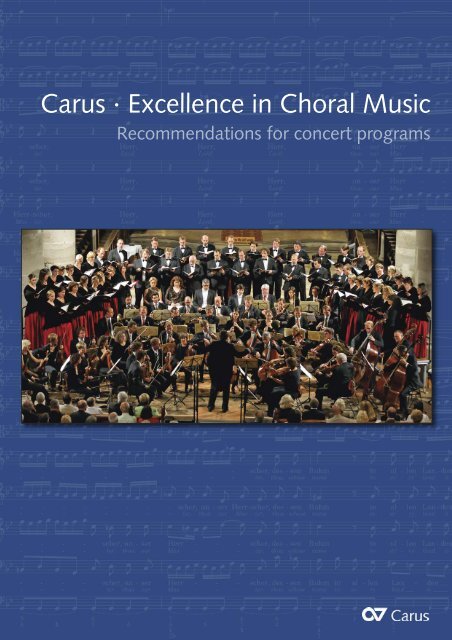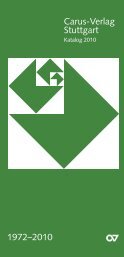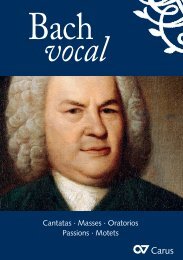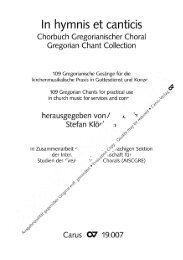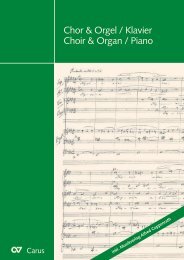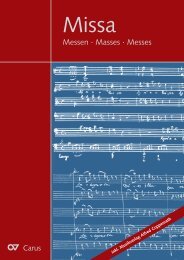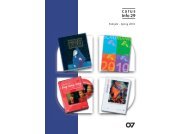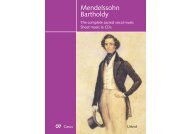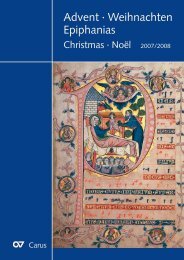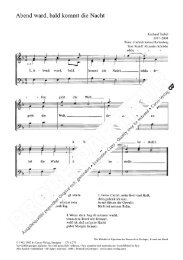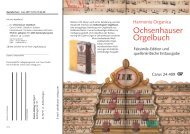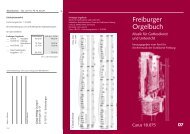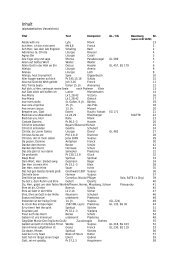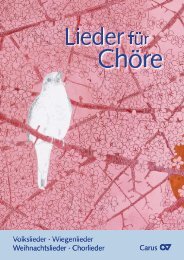Create successful ePaper yourself
Turn your PDF publications into a flip-book with our unique Google optimized e-Paper software.
Carus · Excellence in Choral Music<br />
Recommendations for concert programs
www.carus-verlag.com<br />
Carus · Excellence in Choral Music<br />
Carus · The Expert for choral music<br />
Carus was founded in 1972 with the aim of publishing editions of sacred choral music drawn from previously unpublished<br />
works, works out of print or works in older editions which did not conform to the standards of modern editorial practice. In<br />
pursuing its goal of continually expanding the repertoire available to choirs, Carus has become a leading publisher of sacred<br />
music worldwide.<br />
Carus · Up to date Urtext edition<br />
– Urtext founded upon the latest musicological developments: including the latest musicological research and newly<br />
discovered sources,<br />
– full scores with forewords, critical reports and/or remarks concerning the edition and suggestions for performance practice,<br />
– easily playable vocal scores,<br />
– performance material for all works, with cue notes and practical page turns, choral scores, orchestral parts and figured bass<br />
realizations for all works,<br />
– the excellent quality of Carus music engraving<br />
Carus · High quality editions<br />
Carus editions adhere to the highest scholarly standards. They include informative forewords in English, German and French<br />
and they are also distinguished by the excellent quality of their music engraving, as well as by their attractive presentation.<br />
The “Stuttgarter Ausgaben” of works by Bach, Mozart, Schubert and Mendelssohn are recognized worldwide as leading<br />
Urtext editions of sacred repertoire.<br />
In the production of the editions we place great importance on a high-quality format, starting with the choice of paper via<br />
the precise printing to a stable, durable binding.<br />
This catalog presents an overview of the most important Carus Urtext editions of central European choral repertoire from the<br />
17th–19th centuries. To view our complete catalog please visit www.carus-verlag.com or ask for our Complete catalog 2010.<br />
Content<br />
Bach, Johann Sebastian: Christmas Oratorio BWV 248 4<br />
– St. John Passion BWV 245 3<br />
Beethoven, Ludwig van: Mass in C major op. 86 11<br />
– Missa solemnis op. 123 11<br />
Brahms, Johannes: Ein deutsches Requiem op. 45 15<br />
Buxtehude, Dieterich: Membra Jesu nostri BuxWV 75 5<br />
– The last Judgement BuxWv Anh. 3 5<br />
Cherubini, Luigi: Requiem in c minor 13<br />
Dvorák, Antonín: Mass in D op. 86 15<br />
Fauré, Gabriel: Requiem op. 48 16<br />
Handel, George Frideric: Messiah HWV 56 6<br />
– Ode for St. Cecilia’s Day HWV 76 6<br />
Haydn, Joseph: Missa in Angustiis (Lord Nelson Mass) 8<br />
Mendelssohn Bartholdy, Felix: Christus op. 97 12<br />
– Elijah op. 70 12<br />
– St. Paul op. 36 12<br />
Mozart, Wolfgang Amadeus: Missa in C minor 9<br />
– Requiem K. 626 9<br />
Puccini, Giacomo: Messa di Gloria SC 6 16<br />
Rossino, Gioachino: Petite Messe solennelle 14<br />
Saint-Saëns, Camille: Oratorio de Noël op. 12 13<br />
Schubert, Franz: Mass in A flat major D 678 10<br />
Vivaldi, Antonio: Gloria RV 589 7<br />
Carus-Verlag Stuttgart<br />
Sielminger Straße 51<br />
D-70771 Leinfelden-Echterdingen<br />
Telefon +49 (0)711-797 330-0<br />
Fax +49 (0)711-797 330-29<br />
e-mail: sales@carus-verlag.com<br />
www.carus-verlag.com<br />
Abbreviantions, symbols<br />
� = 20% / Price valid fm 20 cpy. / fm 50 cpy. 5% / fm 100 cpy 10%<br />
discount / 20% surcharge for less than 20 cpy<br />
( ) = Instruments in parentheses indicate alternative scoring<br />
Les instruments notés entre parenthèses désignent les autres<br />
distributions possibles<br />
[ ] = Instruments in brackets indicate ad libitum scoring<br />
Les instruments notés entre crochets désignent les distributions<br />
ad libitum<br />
Armo harmonium<br />
Bc basso continuo · basse continue<br />
Cb contrabasso · contrebasse<br />
Clt clarinet · clarinette<br />
Cor horn · cor<br />
Ctr clarino · clarine<br />
Fg bassoon · basson<br />
Fl flute · flûte traversière<br />
Ob oboe · hautbois<br />
Org organ · orgue<br />
Pfte pianoforte · piano<br />
Pic piccolo<br />
Tast keyboard instrument · instrument à clavier<br />
Tb tuba<br />
Timp timpani · timbales<br />
Tr trumpet · trompette<br />
Trb trombone<br />
Va viola · alto<br />
Vc violoncello · violoncelle<br />
Vl violin · violon<br />
All additional abbreviations will be found in our complete catalog or at<br />
www.carus-verlag.com/help.html<br />
Prices are subject to change. Errors excepted.<br />
Les livraisons ne peuvent être promises que sous les réserves d’usage.<br />
Compiled in December 2010<br />
Carus 99.058<br />
Cover: Kammerchor Stuttgart, Hofkapelle Stuttgart, Frieder Bernius<br />
Schwäbisch Gmünd 2007
Johann Sebastian Bach (1685–1750<br />
St. John Passion / Johannespassion BWV 245 (text in English and German)<br />
Urtext / traditional version & version IV (1749)*<br />
Soli T (Evangelist), B (Jesus), SATB, Coro SATB, 2 Fl, 2 Ob, Vga, 2 Vl, Va, Bc / 120 min<br />
First critical Urtext edition of version IV (1749)*, ed. by Peter Wollny, in conjunction<br />
with the Bach-Archiv, Leipzig, 2004<br />
The St. John Passion ranks among the great vocal works from Bach’s Leipzig years. In<br />
contrast to his other large-scale choral works, however, Bach never gave this work a<br />
definitive final form. Rather, for every performance he made numerous changes. All<br />
previous editions of the St. John Passion have combined readings from various layers of<br />
sources. The wish often expressed by conductors to perform an authentic version is<br />
made possible for the first time with the present edition in this fourth and final version<br />
which was performed under Bach’s direction in 1749. At the same time, with the aid of<br />
the appendix it is possible to perform the work in the traditional “mixed version.”<br />
St. John Passion BWV 245<br />
© by Carus-Verlag, Stuttgart – Carus 31.245<br />
Johann Sebastian Bach<br />
(1685–1750)<br />
Traditional version / version IV (1749) *(the unfinished revision [1739] as appendix)<br />
31.245 full score 80.00 € | 31.245/03 vocal score 12.00 € | 31.245/07 study score 19.90 € | 31.245/09 set of 5 harmony parts 49.50 €<br />
31.245/11–14 4 strings a 9.90 € | 31.245/49 organ 39.80 €<br />
Johann Sebastian Bach 3<br />
Version I (1724) & Version II (1725) are also available. For more details see our Complete Catalog or the Carus Online Catalog.<br />
postcard Carus 40.398/10<br />
www.carus-verlag.com
www.carus-verlag.com<br />
4 Johann Sebastian Bach<br />
Christmas Oratorio BWV 248 (text in English and German). Urtext<br />
Soli SATB, Coro SATB, 2 Fl, 2 Ob (Obda), 2 Eh, 3 Tr, Timp, 2 Cor, 2 Vl, Va, Bc<br />
(ed. K. Hofmann)<br />
With the new edition of the Christmas Oratorio in the framework of the Stuttgart Bach<br />
Editions, Carus presents a scholarly edition for performance. The bases for this publication<br />
are Bach’s autograph score and the original parts. The conductor’s score contains in<br />
an appendix a concise Critical Report which gives information about the sources and<br />
their readings, and, when necessary these are discussed in more detail, especially in<br />
questions of articulation, how it varies from previous editions, and how it provides new,<br />
differing solutions. The fine, linen-bound volume is supplemented by a study score,<br />
choral score, vocal score and the orchestral parts. In the orchestral parts the coordination<br />
between Sprechgesang and the instrumental accompaniment in the recitatives is<br />
made easier through the addition of a vocal staff above the instrumental part; cue notes<br />
showing the end of the recitative are printed in those parts which rest during a secco<br />
recitative, thus assuring their entrance in the following movement.<br />
Carus offers 3 options:<br />
Part I–VI:<br />
31.248/50 full score (Ln) 88.00 € | 31.248/53 vocal score 13.80 € | 31.248/55 choral score � 7.80 € / 31.248/07 study score 20.50 €<br />
31.248/59 set of 12 harmony parts 72.00 € | 31.248/61–64 4 strings a 9.80 € | 31.248/69 organ 39.50 €<br />
Part I–III (1st through 3rd days of Christmas):<br />
31.248 full score 51.00 € | 31.248/03 vocal score 7.80 € | 31.248/05 choral score � 5.40 € | 31.248/09 set of 10 harmony parts 39.00 €<br />
31.248/11–14 4 strings a 5.30 € | 31.248/49 organ 25.50 €<br />
Part IV–VI (New Year to Epiphany):<br />
31.248/50 full score 88.00 € | 31.248/73 vocal score 7.80 € | 31.248/75 choral score � 5.40 € | 31.248/79 set of 8 harmony parts 39.00 €<br />
31.248/81–84 4 strings a 5.90 € | 31.248/99 organ 25.50 €<br />
Further works by Bach<br />
Cantatas<br />
150 Bach cantatas are available in Carus editions with complete performance<br />
material for sale. More information in our Complete Catalog or in the Online<br />
Catalog.<br />
Motets<br />
Complete motets without Bc. Critical new edition (text in German) (ed. U. Wolf)<br />
31.224/10 single copy 14.80 € | > 20 copies � 13.50 €<br />
Separate editions (text in English and German)<br />
(in BWV order)<br />
– 225 Singet dem Herrn ein neues Lied | 31.225<br />
– 226 Der Geist hilft unser Schwachheit auf | 31.226<br />
– 227 Jesu, meine Freude | 31.227<br />
– 228 Fürchte dich nicht | 31.228<br />
– 229 Komm, Jesu, komm | 31.229<br />
– 230 Lobet den Herrn, alle Heiden | 31.230<br />
– 231 Sei Lob und Preis mit Ehren. Choralchor | 31.231<br />
– Ich lasse dich nicht, du segnest mich denn Anh. 159 | 35.003<br />
– Jauchzet dem Herrn, alle Welt Anh. 160 TVWV 8:10, BWV Anh. 160 + 231<br />
35.002<br />
Latin church music<br />
– 232Missa in b minor in preparation<br />
– 233 Missa in F | 31.233<br />
– 234 Missa in A | 31.234<br />
– 235 Missa in G minor | 31.235<br />
– 236 Missa in G BWV | 31.236<br />
Passions and oratorios<br />
– 244 St. Matthew Passion in preparation<br />
– 247 St. Mark Passion BWV 247 (reconstruction: Hellmann / Glöckner) (G) | 31.247<br />
– 249 Easter Oratorio BWV 249 (text in English and German) | 31.249
Dieterich Buxtehude (ca. 1637–1707)<br />
Membra Jesu nostri BuxWV 75 (text in Latin). Urtext<br />
Coro SSATB, 2 Vl, Vne, 5 Vga, Bc (ed. Th. Schlage)<br />
63 min<br />
For Passion in 1680 Dieterich Buxtehude composed his largest work in the style of an oratorio,<br />
the cantata cycle Membra Jesu nostri and he dedicated it to his friend, the Swedish<br />
Court Music Director, Gustav Düben. The feet, knees, hands, side, chest, heart and face of<br />
the crucified Christ are interpreted allegorically.in each of the seven separate cantatas which,<br />
in principle, follow the scheme – instrumental introduction – choral movement with biblical<br />
texts – vocal soli (aria) with a sacred text from the Middle Ages – repetition of the choral<br />
movement. the feet, knees, hands, side, chest, heart and face of the crucified Christ are<br />
interpreted allegorically.<br />
Recorded by Dresdner Kammerchor, Hans-Christoph Rademann (Carus 83.234)<br />
36.013 full score 34.90 € | 36.013/03 vocal score 18.50 € | 36.013/05 choral score � 3.50 €<br />
36.013/09 5 Vga 9.90 € | 36.013/11–14 4 strings a 4.90 €<br />
Burkhard Kinzler: Sechs Intermedien zu Buxtehudes Membra Jesu nostri<br />
(2 Vl, Tenorgambe, VC, Vne, Theorbe, Orgelpositiv) | 36.013/50<br />
Dieterich Buxtehude 5<br />
The interludes are composed transitions which can be performed between the seven movements of Buxtedhude's cantata<br />
Membra Jesu nostri, thus resulting in the cantata sequence designed as a large, connected musical-dramatic whole.<br />
ascribed to Buxtehude:<br />
Das jüngste Gericht / The last Judgement<br />
Wacht! Euch zum Streit gefasset macht BuxWV Anh. 3 (text in German)<br />
Urtext / Soli SSSATB, Coro SSATB, 2 Vl, 2 Va, Bc, [2 Trb] / 137 min<br />
ed. Ton Koopman<br />
This composition, ascribed to Buxtehude, has come down to us without a title page<br />
in a set of parts, which were copied for Stockholm in the 1680s. All genres of compo-<br />
postcard Carus 40.382/10<br />
sition at that time are represented in this work: the then modern aria, richly decorated<br />
chorales, and free adaptation of biblical passages. If Wacht! Euch zum Streit<br />
gefasset macht was composed by Buxtehude, this work belongs in the context of the Lübeck Abendmusiken. The libretti of<br />
some of the oratorios composed by Buxtehude for those occasions have survived, but the music has been lost. This work may<br />
be the only extant oratorio which demonstrates its composer’s versatility in a field akin to opera.<br />
36.019 full score 59.80 € | 36.019/03 vocal score 24.95 € | 36.019/05 choral score � 6.80 € | 36.019/09 2 Trb 2.80 € | 36.019/11–15 5 strings a 9.40 €<br />
36.019/49 organ 39.50 €<br />
Tip for your Buxtehude concert:<br />
– Missa brevis<br />
(36.020, 8 min)<br />
– Nun danket alle Gott<br />
(36.016, 12 min)<br />
More than 30 cantatas by Buxtehude are available for sale from Carus<br />
with the complete performance material. See our Complete Catalog or the<br />
Carus Online Catalog.<br />
� separate catalog with all works by Dieterich Buxtehude available<br />
www.carus-verlag.com
www.carus-verlag.com<br />
6 George Frideric Handel<br />
postcard Carus 40.356/10<br />
George Frideric Handel (1685–1759)<br />
Messiah HWV 56 (text in English and German). Urtext<br />
Soli SATB, Coro S(S)ATB, 2 Ob, 2 Fg, 2 Tr, Timp, 2 Vl, Va, Bc / 150 min<br />
(ed. Ton Koopman & Jan Siemons)<br />
George Frideric Handel is considered England’s first and foremost composer of oratorios.<br />
Above all, the Messiah is regarded as the epitome of sacred music and in<br />
German-speaking countries it is also one of the most often performed works in the<br />
genre. The version of the Messiah which is most often performed today is a combination<br />
of various versions. Consequently, the present critical edition by Ton Koopman<br />
contains all of the surviving alternative versions of the solo movements. These<br />
are printed consecutively instead of being banished to an appendix. A concordance<br />
makes it possible to assign these movements to those various performances of the<br />
work conducted by Handel between the Dublin premiere in 1742 and the London<br />
concerts which took place up to 1759. The score is printed in English and German.<br />
In accordance with the wishes voiced by many choral conductors and singers, the<br />
vocal score will be available in separate English and German versions.<br />
– The traditional, most well-known version is available in the vocal score<br />
– The complete movement variants, contained in the score and parts, and are available in a separate vocal score (soloists)<br />
– Improved readability through two separate vocal scores (in English or German)<br />
– Suggestions for embellishment, based on the most recent findings of performance practice and recommended by Ton Koopman<br />
– Vocal scores available for choirs at a reasonable price<br />
Recorded by Kammerchor Stuttgart, Barockorchester Stuttgart and renowned soloist, Frieder Bernius (Carus 83.219)<br />
55.056 full score 98.80 € | 55.056/01 full score (Ln) 128.00 € | 55.056/03 vocal score (E) for soloists 16.50 € | 55.056/04 vocal score (E) for the choir 13.90 €<br />
55.056/07 study score 20.50 € | 55.056/09 set of 6 harmony parts 38.70 € | 55.056/11–14 4 strings a 9.95 € | 55.056/24 Choristfagott 8.60 €<br />
55.056/49 organ 27.50 €<br />
Ode for St. Cecilia’s Day HWV 76 (text in English). Urtext<br />
Soli ST, Coro SATB, Fl, 2 Ob, 2 Tr, Timp, 2 Vl, Va, Bc<br />
50 min<br />
During the late 17th century each year English musicians celebrated on 13 November the<br />
feast of St. Cecilia, the patron saint of music, with special concerts and church services.<br />
With his Ode for St. Cecilia’s Day Handel rejuvenated the tradition of this festival on St.<br />
Cecilia’s Day in 1732. This so-called “little” St. Cecilia Ode is a musically joyful glorification<br />
of the power of music: two festive choruses frame five charming arias in each of<br />
which a solo instrument is used for contrasting effect in the baroque manner. Handel allows<br />
the soloists a wealth of freedom to improvise and display their skills. This is especially<br />
the case for the organ, which was his favorite instrument.<br />
Recorded by Kölner Kammerchor, Collegium Cartusianum and renowned soloist, Peter Neumann (Carus 83.424)<br />
10.372 full score 34.00 € | 10.372/03 vocal score 15.00 € | 10.372/05 choral score � 3.80 € | 10.372/07 study score 19.80 €<br />
10.372/09 set of 7 harmony parts 29.80 € | 10.372/11–14 4 strings a 7.60 € | 10.372/49 organ 19.00 €<br />
More Handel available from Carus<br />
– Israel in Egypt | 55.054<br />
– Brockes Passion | 55.048<br />
– L’Allegro, il Pensieroso ed il Moderato | 29.214<br />
– Acis and Galathea (arr. Mendelssohn Bartholdy) | 55.049<br />
– Dettinger Te Deum (arr. Mendelssohn Bartholdy) | 55.283/50<br />
– Three Latin Psalm settings: Dixit Dominus | 55.232; Laudate pueri | 40.417;<br />
Nisi Dominus | 55.238<br />
For more information see our Complete Catalog or the Carus Online Catalog.<br />
� separate catalog with all works by George Frideric Handel available<br />
Concert tip:<br />
Perform Handel’s Ode for<br />
St. Cecilia’s Day together<br />
with his O be joyful<br />
(10.179, 30 min).
postcard Carus 40.383/10<br />
Antonio Vivaldi (1678–1741)<br />
Gloria RV 589 (text in Latin). Urtext<br />
Soli SSA, Coro SATB, Ob, Tr, 2 Vl, Va, Vc/Cb, Bc, organ / 30 min<br />
The revival of Antonio Vivaldi’s music in the 20th century went hand in hand with the new<br />
discovery of a large amount of his sacred vocal music which ranged in repertoire from largescale<br />
compositions for the Mass and Vespers to biblical oratorios and solo motets. The first revivals<br />
of Vivaldi’s church music, including the Gloria RV 589, were received almost as a<br />
sensation. They clearly show that, just in the field of church music he attained some of his<br />
greatest artistic achievements.<br />
40.001 full score 13.00 € | 40.001/03 vocal score 7.50 € | 40.001/05 choral score � 3.80 €<br />
40.001/09 set of 2 harmony parts 6.00 € | 40.001/11–14 4 strings a 3.90 € | 40.001/49 organ 11.00 €<br />
Gloria in D RV 589 Antonio Vivaldi<br />
(1678–1741)<br />
© by Carus-Verlag, Stuttgart – Carus 40.001<br />
Concert suggestion:<br />
Perform Vivaldi’s<br />
Gloria RV 589 together with<br />
his Introduzione e Gloria<br />
RV 588 (40.008, 30 min), and<br />
in between a smaller, more<br />
silent, sacred work by<br />
Vivaldi.<br />
Further Vivaldi music available by Carus:<br />
– Credo RV 591 (L) | 40.004<br />
– Juditha triumphans RV 644. Oratorio | 40.010<br />
– Dixit Dominus (Psalm 109) RV 594 (L) | 40.007<br />
– Domine ad adiuvandum RV 593 (L) | 40.003<br />
– Introduzione e Gloria RV 588 (L) | 40.008<br />
– Kyrie RV 587 (L) | 40.005<br />
– Magnificat RV 610 (L) | 40.002<br />
– Psalm 110 ”Confitebor” RV 596 (L) | 40.011<br />
– Psalm 111 ”Beatus vir” 8 RV 597 (L) | 40.012<br />
– Psalm 121 ”Laetatus sum” RV 607 (L) | 40.013<br />
Antonio Vivaldi 7<br />
For details of all works see our Complete Catalog or the Carus Online Catalog.<br />
www.carus-verlag.com
www.carus-verlag.com<br />
8 Joseph Haydn<br />
postcard Carus 40.392/10<br />
Joseph Haydn (1732–1809)<br />
Missa in Angustiis, “Lord Nelson Mass” in D Hob. XXII:11 (1798) (text in Latin)<br />
Soli SATB, Coro SATB, 3 Ctr, Timp, 2 Vl, Va, Bc, [Fl, 2 Ob, 2, Clt, Fg, 2 Cor] / 40 min<br />
This important late Haydn Mass belongs to the category of the Missa solemnis, intended for use<br />
at a lavishly appointed High Mass. Written in 1798, this is the third of the “six late masses,”<br />
each of which was composed to celebrate the name day in a particular year of Princess Maria<br />
Josepha Hermenegilda Esterházy. Haydn’s own title, Mass in times of affliction referred to the<br />
threat of invasion by Napoleon’s army, also allud ed to in the last movement of the Missa in tempore<br />
belli two years earlier. In many respects Haydn continued his symphonic practices in this<br />
late mass: the shorter liturgical sections of the Ordinarium Missae are linked in tonality and form,<br />
impressive structures are fashioned, and the vocal solos are no longer isolated arias. The unauthentic<br />
name Nelson Mass is of doubtful origin, but it certainly refers to the British admiral<br />
Nelson, who on August 1798 defeated Napoleon’s fleet at the Battle of the Nile.<br />
40.609 full score 68.00 € | 40.609/03 vocal score 14.00 € | 40.609/05 choral score � 5.50 €<br />
40.609/07 study score 21.00 € | 40.609/09 set of 12 harmony parts 22.50 € | 40.609/11–14 4 strings a 5.30 €<br />
40.609/49 organ 16.50 €<br />
All masses by Joseph Haydn are available for sale with complete performance material<br />
– Missa brevis in F major Hob. XXII:1 | 40.601<br />
– Missa in honorem BVM in E flat major, “Great Organ Solo Mass” Hob. XXII:4 | 40.603<br />
– Missa Cellensis in honorem BVM in C major, “Great Mariazell Mass” Hob. XXII:5 | 40.604<br />
– Missa Sancti Nicolai in G major, “Nicolai Mass” Hob. XXII:6 | 40.605<br />
– Missa brevis Sti. Joannis de Deo in B flat major, “Little Organ Solo Mass” Hob. XXII:7 | 40.600<br />
– Missa Cellensis in C major, “Little Mariazell Mass” Hob. XXII:8 | 40.606<br />
– Missa in tempore belli in C major, “Paukenmesse” (Mass in Time of War) Hob. XXII:9 | 40.607<br />
– Missa Sancti Bernardi von Offida in B flat major, “Heiligmesse” (Holy Mass) Hob. XXII:10 | 40.608<br />
– Missa in Angustiis, “Lord Nelson Mass” Hob. XXII:11 | 40.609<br />
– Missa in B flat major, “Theresienmesse” (Maria Theresa Mass) Hob. XXII:12 | 40.610<br />
– Missa in B flat major, “Creation Mass” Hob. XXII:13 | 40.611<br />
– Missa in B flat major, “Harmony Mass” (Wind Band Mass) Hob. XXII:14 | 40.612<br />
also available<br />
Choral collection Mozart · Haydn<br />
The choral collection Mozart · Haydn contains sacred music of two famous pairs<br />
of composers from the Viennese classical school: father and son Leopold and<br />
Wolfgang Amadeus Mozart, and the brothers Joseph and Johann Michael<br />
Haydn. The compilation of both famous and little-known works offers a broad<br />
insight into the repertoire of church music from the Viennese classical school.<br />
Vol. I: for equal voices | 2.111<br />
Vol. II: for choirs with only one male voice | 2.112<br />
Vol. III: for mixed choirs | 2.113<br />
Concert tip:<br />
Perform the Lord<br />
Nelson Mass together<br />
with the Magnificat<br />
BWV 243 by Johann<br />
Sebastian Bach<br />
(31.243, 30 min).<br />
Special edition:<br />
The complete Latin Masses of Haydn are available as study scores in an attractive case | 51.990, 179.00 €<br />
In preparation:<br />
Urtext editions of:<br />
– The Creation | 51.990 (April 2011)<br />
– The Seven Words<br />
– Te Deum<br />
– Stabat Mater
Wolfgang Amadeus Mozart (1756–1791)<br />
Requiem K. 626 (text in Latin). Urtext<br />
Soli SATB, Coro SATB, 2 Corni di bassetto, 2 Fg, 2 Ctr, 3 Trb, Timp, 2 Vl, Va, Bc / 50 min<br />
Recorded by Kammerchor Stuttgart, Barockorchester Stuttgart and renowned soloist,<br />
Frieder Bernius (Carus 83.207)<br />
In the version completed 1792 by F. X. Süßmayr, commissioned by the widow Mozart<br />
(ed. U. Leisinger)<br />
The history of the genesis of the Requiem is entwined with legends and anecdotes. The burdens<br />
of the composition and performance of La Clemenza di Tito and Die Zauberflöte, and an acute<br />
postcard Carus 40.390/10<br />
infection led to the collapse and death of the composer following a short illness. Mozart left his<br />
wife in considerable debt. Constanze therefore turned to Mozart’s friends, asking them to complete<br />
the fragment. After two failed attempts, the task passed to Mozart’s pupil Franz Xaver Süßmayr, who completed the<br />
Requiem in the form known today, using working materials that are no longer extant, and perhaps verbal instructions from<br />
the composer. Today the Süßmayr version is still the most well known, and it is doubtless the one with the closest historical<br />
ties to Mozart. Süßmayr’s version of the Requiem has been published in a new edition which is true to the original sources.<br />
51.626 full score 48.60 € | 51.626/03 vocal score 7.60 € | 51.626/05 choral score � 4.80 € | 51.626/07 study score 17.80 €<br />
51.626/09 set of 7 harmony parts 37.80 € | 51.626/11–14 4 strings a 6.00 € | 51.626/49 organ 15.95 €<br />
In the completion by Robert D. Levin / 80 min<br />
The attacks against Süßmayr’s completion began in 1825, when the so-called “Requiem Controversy”<br />
erupted. Over the last decade a number of musicians have attempted to cleanse the<br />
Requiem of the deficiencies introduced by Süßmayr. The completion published here takes into account<br />
the tendencies of the newer versions (such as revised instrumentation, or recomposition<br />
of some parts). At this the character, texture, voice leading, continuity and structure of Mozart’s<br />
music was observed. Details on each separate movement will be found in the Critical Report.<br />
51.626/50 full score 69.00 € | 51.626/53 vocal score 8.95 € | 51.626/57 study score 29.90 €<br />
51.626/59 set of 10 harmony parts 36.00 € | 51.626/61–64 4 strings a 6.95 € | 51.626/99 organ 16.00 €<br />
Missa in C minor in the reconstructions and completion by Robert D. Levin<br />
Urtext / Soli SSTB, Coro SATB/SATB, Fl, 2 Ob, 2 Fg, 2 Cor, 2 Ctr, 3 Trb, Timp, 2 Vl, Va, Bc<br />
80 min<br />
51.427 full score 89.80 € | 51.427/03 vocal score 15.80 € | 51.427/07 study score 29.90 €<br />
all performance material for rental only<br />
Wolfgang Amadeus Mozart 9<br />
Note!<br />
The complete church music by Mozart is available in Carus Urtext editions with the<br />
complete performance material for sale. The scores have been critically edited in just<br />
the last few years and thus the editors have been able to take into consideration the<br />
newest source discoveries. Every volume contains a detailed foreword with information<br />
concerning the genesis, scoring, sources and performance history of the larger<br />
works.<br />
See more details in our Complete Catalog or in the Carus Online Catalog.<br />
Special edition: The complete sacred vocal music as study scores<br />
For the Mozart anniversary year of 2006 his sacred vocal works were published in a<br />
high quality, special edition. Set I contains 20 volumes including the complete<br />
Masses, also the Requiem, and both Vespers.<br />
All of his additional sacred works are included in set II containing 9 volumes. The editions<br />
are based on the latest musicological developments and they offer musicians<br />
and music lovers alike a treasure of Mozart’s sacred music.<br />
Vol. I: All masses & 2 vespers: Carus 51.000, 20 study scores, 149.00 €<br />
Vol. II: Shorter church works: Carus 51.001, 9 study scores, 129.00 €<br />
�separate catalog with all works by Wolfgang Amadeus Mozart available<br />
www.carus-verlag.com
www.carus-verlag.com<br />
10 Franz Schubert<br />
postcard Carus 40.379/20<br />
Franz Schubert (1797–1828)<br />
Mass in A flat major D 678 (text in Latin). Urtext<br />
Soli SATB, Coro SATB, Fl, 2 Ob, 2 Clt, 2 Fg, 2 Cor, 2 Tr, 3 Trb, Timp, 2 Vl, Va, Vc, Cb, organ<br />
50 min<br />
Between 1814 and 1828 Franz Schubert composed six Latin masses. Whereas the early masses<br />
were conceived more for practical performance in Schubert’s home town of Lichtenthal, because<br />
of their length, their level of technical difficulty, as well as the almost symphonic design, the later<br />
settings present a greater challenge. Actually, Schubert’s Mass in A flat major was composed in<br />
light of his ambitions to obtain the post of Assistant Music Director in Vienna. But Emperor<br />
Franz I preferred masses which were short and easy to perform – something which cannot be<br />
claimed for this Mass.<br />
40.659 full score 52.00 € | 40.659/03 vocal score 11.50 € | 40.659/05 choral score � 6.50 € | 40.659/07 study score 19.40 €<br />
40.659/09 set of 15 harmony parts 60.00 € | 40.659/11–15 5 strings a 5.50 € | 40.659/49 organ 17.50 €<br />
Mass in A flat major D 678<br />
© by Carus-Verlag, Stuttgart – Carus 40.659/03<br />
The complete masses by Schubert<br />
The Carus program of publications will encompass Schubert’s complete sacred compositions<br />
and it is intended to emphasize the wide range of his works in this area. Many of the smaller<br />
liturgical compositions are published here for the first time in separate editions. What is to be<br />
discovered is a fascinating oeuvre, rooted in the ”stile antico” and in the compositions of the<br />
Viennese classical masters, but whose exquisite lyricism and harmonic subtlety reveal a typically<br />
Schubertian world of expression.<br />
– Mass in F major D 105 (L) | 40.656<br />
– Mass in G major D 167 (L)<br />
– after the parts from Kloster Neuburg | 40.675<br />
– edition based on the autograph score with additional oboes and bassoons<br />
by Ferdinand Schubert | 40.643<br />
– Mass in B flat major D 327 (L) | 40.657<br />
– Mass in C major D 425 (L) | 40.658<br />
– Mass in E flat major D 950 (L) | 40.660<br />
– Liturgical songs, sacred and secular songs<br />
For more details see our Complete Catalog or the Carus Online Catalog.<br />
Special edition:<br />
The Latin Masses, set of six study scores in a box | Carus 40.901, 80.00 €<br />
Franz Schubert<br />
(1797–1828)<br />
Vocal score: Mathias Siedel<br />
Concert tip:<br />
Perform the Mass in A flat<br />
major together with the<br />
solennes de Confessore KV<br />
339 by Wolfgang Amadeus<br />
Mozart (40.059, 30 min).
Ludwig van Beethoven (1770–1827)<br />
Mass in C major op. 86 (text in Latin). Urtext<br />
Soli SATB, Coro SATB, 2 Fl, 2 Ob, 2 Clt, 2 Fg, 2 Cor, 2 Tr, Timp, 2 Vl, Va, Basso (Vc, Cb, organ)<br />
50 min<br />
(ed. Ernst Herttrich)<br />
With its tonal language of subjective avowal, the first of Beethoven’s two masses opens up new<br />
worlds of expression for the liturgical texts of the Mass which are expressly modern and point<br />
towards the future. Not to be considered a preliminary work to the Missa solemnis, it is an entirely<br />
independent work which set standards for the further development of settings of the Mass<br />
in the 19th century. Its newness, of which the composer himself was fully aware (“I do not speak<br />
postcard Carus 40.389/40<br />
gladly of my Mass, or of myself, but I do believe that I have treated the text in a manner in<br />
which only few have treated it.”), paves the way to an hitherto unknown, contemporary avenue<br />
of faith which today is still current. Carus presents this important work of church music history in a new critical edition<br />
by the Beethoven expert Ernst Herttrich.<br />
40.688 full score 63.00 € | 40.688/03 vocal score 9.90 € | 40.688/05 choral score � 5.40 € | 40.688/09 set of harmony parts | 40.688/11–14 4 strings a 4.95 €<br />
40.688/49 organ 11.50 €<br />
Mass in C major op. 86<br />
© 2010 by Carus-Verlag, Stuttgart – Carus 40.688/03<br />
Coming soon:<br />
Missa solemnis op. 123 (text in Latin)<br />
Soli SATB, Coro SATB, 2 Fl, 2 Ob, 2 Clt, 2 Fg, 4 Cor, 2 Tr, 3 Trb, Timp, 2 Vl, Va, Vc, Cb, Org / 90 min<br />
(ed. Ernst Hettrich)<br />
“… my greatest and most accomplished work” – with no lesser words Beethoven himself expressed his own high regard for<br />
the Missa solemnis. From the very beginning this mass was especially close to his heart; hardly any other work occupied him<br />
so long and so intensively. Research in the fields of theology, liturgics and the history of church music from Gregorian chant<br />
via Palestrina to Bach and Handel, up to the relevant works of his direct predecessors accompanied the composition of this<br />
work. Accordingly, although of a great stylistic unity, the Missa solemnis shows that it is a compendium of the entire liturgical,<br />
sacred, religious music composed up until that time.<br />
Following the publication of Beethoven’s Mass in C major op. 86, Carus now presents the Missa solemnis in a new Urtext<br />
edition by the Beethoven scholar, Ernst Herttrich. The edition contains a foreword in German, English and French, as well as a<br />
Critical Report in compact form with all of the pertinent information concerning the situation of the sources, the edition and<br />
readings.<br />
40.689 full score<br />
The score will be availabe in April 2011!<br />
Ludwig van Beethoven<br />
(1770–1827)<br />
Vocal score: Paul Horn<br />
Ludwig van Beethoven 11<br />
Concert tip:<br />
Perform this Mass in C<br />
major together with the<br />
Te Deum by Józef Swider<br />
(7.412, 20 min).<br />
www.carus-verlag.com
www.carus-verlag.com<br />
12 Felix Mendelssohn Bartholdy<br />
postcard Carus 40.389/40<br />
Felix Mendelssohn Bartholdy (1809–1847)<br />
The three Oratorios<br />
Few nineteenth-century oratorios have attained such a firm place in the musical life of our<br />
times as those of Mendelssohn. With their timeless biblical settings, they combine elements of<br />
romanticism with the mighty choral style of Handel and the meditative chorales of Bach.<br />
The complete church works recorded by Frieder Bernius and the Kammerchor Stuttgart are<br />
available on CD.<br />
St. Paul / Paulus op. 36 (1834–1836) (text in English and German). Urtext<br />
Soli SATB, Coro SATB, 2 Fl, 2 Ob, 2 Clt, 2 Fg, 4 Cor, 2 Tr, 3 Trb, Serpente/Contrafagotto, Timp,<br />
2 Vl, Va, Vc, Cb, Org / 145 min (ed. R. Larry Todd)<br />
Mendelssohn composed St. Paul, his first oratorio, under the impression of his own revival of J. S. Bach’s St. Matthew Passion<br />
in 1829. Robert Schuman praised the “inextinguishable color of the instrumentation” and the “brilliant play with all the<br />
forms of composition.” He described it as a “jewel of the present.”<br />
40.129/01 full score (clothbound edition) 129.00 € | 40.129/00 full score (paperbound) 115.00 € | 40.129/03 vocal score (G/E) 16.80 €<br />
40.129/04 vocal score (G) 15.95 € | 40.129/07 study score 35.00 € | 40.129/08 Text � 0.95 € | 40.129/09 set of 19 harmony parts 92.00 €<br />
40.129/11–15 5 strings a 16.00 € | 40.129/49 organ 11.50 €<br />
Elijah / Elias op. 70 (1844–1846) (text in English and German). Urtext<br />
Soli SATB, Coro SATB, 2 Fl, 2 Ob, 2 Clt, 2 Fg, 4 Cor, 2 Tr, 3 Trb, Oficleide, Timp, 2 Vl, Va, Vc/Cb,<br />
Org / 130 min (ed. R. Larry Todd)<br />
“For a subject like Elijah ... the drama must reign supreme ... the characters must be introduced<br />
speaking and acting like living people ... a quite vivid world of the sort we find in every chapter of<br />
the Old Testament.” Mendelssohn to his librettist<br />
40.130/01 full score (clothbound edition) 145.00 € | 40.130/00 full score (paperbound) 119.00 €<br />
40.130/03 vocal score (G/E) 16.80 € | 40.130/04 vocal score 14.80 € | 40.130/07 study score 41.00 € | 40.130/08 Text � 0.95 €<br />
40.130/09 set of 19 harmony parts 146.00 € | 40.130/11–14 4 strings a 14.00 € | 40.130/49 organ 15.00 €<br />
Christus (fragment) op. 97 (1847) (text in English and German). Urtext<br />
Soli STBB, Coro SATTBB, 2 Fl, 2 Ob, 2 Clt, 2 Fg, 2 Cor, 2 Tr (only part 2), 3 Trb, Timp, 2 Vl, Va, Vc, Cb 21 min<br />
(ed. R. Larry Todd)<br />
Mendelssohn left his third oratorio incomplete at the time of his early death in 1847. A fragment of some twenty minutes’<br />
duration survives with two fully orchestrated sections: “The Birth of Christ” and “The Suffering of Christ.” Not only do they<br />
represent a valuable addition to any Christmas or Passion concert, they can also be used in church services.<br />
40.131 full score 38.00 € | 40.131/07 study score 6.25 € | 40.169/03 vocal score (part 1) 5.50 € | 40.169/05 choral score (part 1) � 2.50 €<br />
40.169/09 set of 14 harmony parts (part 1) 18.00 € | 40.169/11–15 5 strings (part 1) a 1.80 € | 40.170/03 vocal score (part 2) 6.50 €<br />
40.170/05 choral score (part 2) � 3.80 € | 40.170/09 set of 16 harmony parts (part 2) 25.00 € | 40.170/11–15 5 strings (part 2) a 1.80 €<br />
The complete sacred music by Mendelssohn<br />
The complete sacred music by Mendelssohn is available from Carus in critical editions<br />
with the complete performance material for sale. The Stuttgart Mendelssohn Editions<br />
include forewords in three languages which provide historical information and analysis<br />
of the works as well as critical comments.<br />
– The five psalms, including Psalm 42 ”Wie der Hirsch schreit”<br />
– Lobgesang. Sinfonie-Kanate<br />
– The eight chorale cantatas<br />
– More Latin and German church works<br />
Special edition:<br />
Mendelssohn’s complete sacred works for choir and orchestra in study scores<br />
40.900, 22 study scores, 299.00 €
Luigi Cherubini (1760–1842)<br />
Requiem in C minor (text in Latin)<br />
Coro SATB, 2 Ob, 2 Clt, 2 Fg, 2 Cor, 2 Tr, 3 Trb, Timp, Tamtam, 2 Vl, 2 Va, Vc, Cb<br />
50 min (ed. Wolfgang Hochstein)<br />
Luigi Cherubini 13<br />
Cherubini’s Requiem in C minor for mixed choir (without vocal soloists) and orchestra, which is presented here in a critical<br />
edition, is among the most significant contributions to this genre in the 19th century. It was composed in Paris in 1816 and<br />
within a short time it became well known. Musicians such as Beethoven, Schumann and Brahms held it in high esteem<br />
because of the work’s superior compositional construction, orchestration, mastery of form and the balance in proportion between<br />
text and music.<br />
Recorded by Kammerchor Stuttgart, Hofkapelle Stuttgart, Frieder Bernius (Carus 83.227)<br />
40.086 full score 51.00 € | 40.086/03 vocal score 9.80 € | 40.086/07 study score 16.90 €<br />
40.086/09 set of 14 harmony parts 37.00 € | 40.086/11–16 6 strings a 6.60 €<br />
Requiem in C minor<br />
© by Carus-Verlag, Stuttgart – Carus 40.086/03<br />
Camille Saint-Saëns (1835–1921)<br />
Oratorio de Noël op. 12 (text in Latin)<br />
Soli SMsATB, Coro SATB, 2 Vl, Va, Vc, Cb, organ, Arpa / 40 min<br />
Luigi Cherubini<br />
(1760–1842)<br />
Vocal score: Paul Horn<br />
Camille Saint Saëns Christmas Oratorio has become a fixture in the choral repertoire. Besides Bach’s Christmas Oratorio or<br />
the Story of Christmas by Heinrich Schütz, with its interesting instrumentation and superior compositional style, this piece offers<br />
an additional possibility for celebrating Christmas.<br />
40.455 full score 24.00 € | 40.455/03 vocal score 14.00 € | 40.455/05 choral score � 2.50 € | 40.455/07 study score 12.30 €<br />
40.455/11–15 5 strings a 3.90 € | 40.455/48 Arpa 5.80 €<br />
Carus recommends:<br />
For choirs with only modest means this Christmas oratorio can be performed<br />
in the version for choir and organ. The choir only needs to purchase<br />
our choral scores.<br />
40.455/45 Choir & organ 12.80 €<br />
Further works for choir and organ:<br />
Concert tip:<br />
Perform Cherubini's<br />
Requiem together with<br />
his rather unknown motet<br />
Sciant gentes (12 min,<br />
same scoring, 40.090), or<br />
the Marche funébre<br />
(16.502, 7 min).<br />
Mozart: Inter natos mulierum | 40.033/45 and Sancta Maria, Mater Dei | 40.053/45<br />
Schubert: Mass in G major | 40.675/45<br />
Joseph Haydn: Missa brevis Sti. Joannis de Deo (Little organ solo Mass) | 40.600/45<br />
Schumann: Missa sacra | 40.687/45<br />
Vierne: Messe solennelle en ut dièse mineur | 27.017/45<br />
www.carus-verlag.com
www.carus-verlag.com<br />
14 Gioachino Rossini<br />
postcard Carus 40.347/10<br />
Petite Messe solennelle<br />
© by Carus-Verlag, Stuttgart – Carus 40.650/01<br />
Further works by Rossini:<br />
– Messa di Rimini | 40.674<br />
– Miserere (Psalm 50) | 40.805<br />
– Stabat Mater | 70.089<br />
Gioachino Rossini (1792–1868)<br />
More Masses for Choir & Orchestra/Instruments<br />
(selection):<br />
Bach: Masses BWV 233–236<br />
Cherubini: Coronation Mass<br />
Beethoven: Missa in C major (see page 11)<br />
Diabelli: Mass in E flat major<br />
Dittersdorf: Missa solemnis in C major<br />
Dvorák: Mass in D major (see page 15)<br />
Gatti / Haydn: Creation Mass<br />
Petite Messe solennelle (text in Latin)<br />
Soli SATB, Coro SATB, 2 Pfte, Armo / 90 min<br />
Next to the Stabat Mater, the Petite Messe solennelle of 1863 is Rossini’s second extensive<br />
sacred composition. Ostensibly, the work was, in a way, an occasional piece (what great work<br />
was not?), written for the dedication of a private chapel for the once well-to-do Parisian nobility.<br />
This explains the reduced instrumental accompaniment for two pianos and harmonium. Of<br />
course this instrumental garb, reminiscent of decent, elevated salon music, produces an unmistakable<br />
timbre which through its typical Rossini rhythm obtains an addedflair.<br />
40.650 full score 45.00 € | 40.650/03 vocal score (1st Pfte) 17.00 € | 40.650/05 choral score � 6.80 €<br />
40.650/07 study score 22.00 € | 40.650/49 2nd Pfte + Armo 26.00 €<br />
Giachino Rossini<br />
(1792–1868)<br />
Joseph Haydn: 12 Latin Masses (see page 8)<br />
Herzogenberg: Mass in E minor<br />
Leopold Mozart: Missa in A major<br />
– Missa solemnis in C major<br />
Wolfgang Amadeus Mozart: Latin Masses (see page 9)<br />
Nicolai: Missa in D major<br />
Puccini: Missa (see page 16)<br />
Rheinberger: Mass in C major<br />
Richter: Messa pastorale in G major<br />
– Mass in A major<br />
Rossini: Messa da Rimini (see page 14)<br />
Schubert: 6 Latin Masses (see page 10)<br />
Telemann: Missa brevis in B minor<br />
For more details see our Complete Catalog or the<br />
Carus Online Catalog.
postcard Carus 40.387/10<br />
Johannes Brahms (1833–1897)<br />
Ein deutsches Requiem op. 45 (text in German)<br />
Soli SB, Coro SATB, Picc, 2 Fl, 2 Ob, 2 Clt, 2 Fg, 4 Cor, 2 Tr, 3 Trb, Tuba, Timp, Arpa, 2 Vl, Va,<br />
Vc, Cb, [Cfg, organ] / 70 min<br />
Since its first complete performance in 1868 in the Cathedral of Bremen, Brahms’s Ein<br />
deutsches Requiem is, without question, one of the key works in the history of the oratorio.<br />
The reputation of the work is based not only on its unusually concentrated musical structure,<br />
but also on the original conception of the text: Brahms assembled important passages from<br />
both the Old and New Testaments in Luther’s translation so that thoughts on sorrow and consolation<br />
would obviously refer to one another. In contrast to many other oratorios of the 19th<br />
century Brahms places the choir, the voice of the community, in the center of this interdenominational<br />
celebration of the dead.<br />
Recorded by Kammerchor Stuttgart, Klassische Philharmonie Stuttgart and renowned soloist, Frieder Bernius (Carus 83.200)<br />
27.055 full score 54.00 € | 27.055/03 vocal score 8.50 € | 27.055/05 choral score � 6.20 € | 27.055/07 study score 19.20 € | 27.055/09 set of harmony parts 79.90 €<br />
27.055/11–15 5 strings a 5.20 € 27.055/48 Arpa 4.25 € | 27.055/49 organ 8.60 €<br />
Our recommandation for choirs which cannot afford the original Brahms orchestration:<br />
Perform the Brahms Requiem in the new arrangement for chamber ensemble<br />
Solo SB, Coro SATB, wind quintet (Picc/Fl, Ob, Clt, Fg, Cor), Timp, string quintet (2 Vl, Va, Vc, Cb)<br />
(arr. Joachim Linckelmann)<br />
27.055/50 full score 76.00 € | 27.055/03 vocal score 8.50 € | 27.055/05 choral score � 6.20 € | 27.055/59 10 parts 40.60 €<br />
More Requiems for Choir & Orchestra/Instruments from Carus (selection):<br />
Campra: Messe de Requiem<br />
Cherubini: Requiem in C minor (see page 13)<br />
Fauré: Requiem (see page 16)<br />
Garcia: Requiem<br />
Hasse: Requiem in E flat Major and Requiem in C major<br />
Johann Michael Haydn: Requiem in C minor / Requiem in B flat major<br />
Kraus: Requiem<br />
Kreek: Requiem<br />
Lachner: Requiem in F minor<br />
Mozart: Requiem (see page 9)<br />
Rheinberger: Requiem in C major<br />
Verdi: Requiem (in preparation)<br />
Antonín Dvorák (1841–1904)<br />
Mass in D op. 86 (text in Latin) / 43 min<br />
With its traditional forms and proven compositional models, its original ideas, which are sometimes<br />
marked by a folk- or folksong-like melodic character, and with its harmonic richness,<br />
Dvorák’s D major Mass serves in its liturgical context to express the worship of God. The Mass<br />
is characterized by lyrical meditation rather than dramatic immediacy.<br />
Orchestra version:<br />
Soli SATB, Coro SATB, 2 Ob, 2 Fg, 3 Cor, 2 Tr, 3 Trb, Timp, 2 Vl, Va, Vc, Cb, organ<br />
40.653 full score 35.00 € | 40.653/03 vocal score 10.50 € | 40.653/05 Chp with Solos � 6.80 €<br />
40.653/09 set of 13 harmony parts 36.50 € | 40.653/11–15 5 strings a 4.20 € | 40.653/49 organ 2.60 €<br />
Organ version:<br />
Soli SATB, Coro SATB, organ – Recorded by Motettenchor Stuttgart, soloist, Günter Graulich (Carus 83.106)<br />
40.651 full score 23.00 € | 40.651/05 Chp with Solos � 6.80 € | 40.651/49 organ 14.50 €<br />
Johannes Brahms · Antonín Dvorák 15<br />
postcard Carus 40.350/10<br />
www.carus-verlag.com
www.carus-verlag.com<br />
16 Gabriel Fauré · Giacomo Puccini<br />
postcard Carus 40.349/10<br />
Gabriel Fauré (1845–1924)<br />
Requiem op. 48<br />
version for symphony orchestra, 1900 (text in Latin)<br />
Soli SBar, Coro SATB, 2 Fl, 2 Clt, 2 Fg, 4 Cor, 2 Tr, 3 Trb, Timp, Vl, 2 Va, 2 Vc, Cb, Arpa, organ<br />
60 min<br />
The Requiem of Gabriel Fauré is undoubtedly the most important opus among the sacred works<br />
of this French master. Beginning with the first performances during the composer’s lifetime, it is<br />
one of those works whose popularity has never waned. In the absence of an autograph score, a<br />
new edition of this work posed a challenge in two important respects: on the one hand, to present<br />
an edition faithful to the often contradictory sources, and on the other, to render a clear and<br />
meaningful musical text of the work.<br />
27.312 full score 68.00 € | 27.312/03 vocal score 9.95 € | 27.312/05 choral score � 3.20 € | 27.312/07 study score 18.20 € | 27.312/09 Set (17) 34.80 €<br />
27.312/11–16 6 strings a 5.00 € | 27.312/49 organ 8.50 €<br />
The church version of this Requiem will be availabe in April 2011 (27.311)!<br />
Giacomo Puccini (1858–1924)<br />
Messa di Gloria (1878–1880) SC 6<br />
(Messa a 4 voci)<br />
Soli TBar, Coro SATB, Ottavino, 2 Fl, 2 Ob, 2 Clt, 2 Fg, 2 Cor, 2 Tr, 3 Trb, Oficleide, Timp, 2 Vl,<br />
Va, Vc, Cb / 43 min<br />
Carus presents the first critical edition of Puccini’s only mass. Based on a comparison with the<br />
autograph score, numerous errors were corrected which had been present in all previous editions<br />
of this mass. In preparing this edition, Puccini’s additions to the instrumentation in the<br />
postcard Carus 40.348/10 Benedictus and his new version of the tenor aria “Gratias agimus” from the Gloria have both<br />
been taken into consideration. The newer version of the tenor aria changes the character of the<br />
piece to such a great degree, that it has been included separately as an appendix in this edition.<br />
The doubling of the brass and string parts, the addition of two French horns and a harp, as well as the addition of an instrumental<br />
postlude which consists of a repetition in the violoncelli of the main section of the aria leads one to believe that possibly<br />
Puccini considered having this Aria performed outside the context of the Mass as a separate concertante piece.<br />
40.645 full score (Ln) 115.00 € | 40.645/03 vocal score 17.50 € | 40.645/07 study score 35.10 €<br />
40.645/09 set of harmony parts 72.00 € | 40.645/11–15 5 Str 6.60 €<br />
Available through:<br />
Concert tip:<br />
Perform the Messa di Gloria<br />
together with the rather unkown<br />
Mottetto per San Paolino by<br />
Puccini (27.403, 15 min). With the<br />
exception of the lack of a solo<br />
tenor in the piece, the scoring is<br />
identical with this one in the<br />
Messa, for this reason it would<br />
seem only natural to perform these<br />
two works together.


